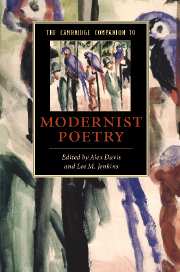Book contents
- Frontmatter
- Introduction
- Part I: Contexts
- Part II: Authors and Alliances
- 5 Pound or Eliot: whose era?
- 6 H.D. and revisionary myth-making
- 7 Yeats, Ireland and modernism
- 8 Modernist poetry in the British Isles
- 9 US modernism I: Moore, Stevens and the modernist lyric
- 10 US modernism II: the other tradition - Williams, Zukofsky and Olson
- 11 The poetry of the Harlem Renaissance
- 12 Caliban’s modernity: postcolonial poetry of Africa, South Asia and the Caribbean
- Part III: Receptions
- Guide to further reading
- Index
- Series List
11 - The poetry of the Harlem Renaissance
from Part II: - Authors and Alliances
Published online by Cambridge University Press: 28 November 2007
- Frontmatter
- Introduction
- Part I: Contexts
- Part II: Authors and Alliances
- 5 Pound or Eliot: whose era?
- 6 H.D. and revisionary myth-making
- 7 Yeats, Ireland and modernism
- 8 Modernist poetry in the British Isles
- 9 US modernism I: Moore, Stevens and the modernist lyric
- 10 US modernism II: the other tradition - Williams, Zukofsky and Olson
- 11 The poetry of the Harlem Renaissance
- 12 Caliban’s modernity: postcolonial poetry of Africa, South Asia and the Caribbean
- Part III: Receptions
- Guide to further reading
- Index
- Series List
Summary
As one of the most significant literary movements of the twentieth century, the Harlem Renaissance (1900-40) reflects the significance of African-American cultural expression during the modernist period. Nonetheless, critical discussions of African-American literature typically treat modernism as a movement separate and distinct from the Harlem Renaissance. As Houston Baker notes, 'Traditionally in discussions of Afro-American literature and culture, “modernism” implies the work of British, Irish, and Anglo-American writers and artists of the early twentieth century.' While this may stem from a tendency among critics to view African-American literature as separate and distinct from Anglo-American, British and Irish literature, the Harlem Renaissance's relationship and connection with the modernist movement reflects the conceptualisation of racial identity and consciousness during the early to mid twentieth century. Consequently, poetry of the Harlem Renaissance attempts to capture the perspective of African-American writers within the context of the modern world. African-American poets of the Harlem Renaissance such as Langston Hughes, James Weldon Johnson, Countee Cullen, Claude McKay, Jean Toomer, Alice Dunbar-Nelson, Helene Johnson, Georgia Douglas Johnson and Angelina Weld Grimkè explored central themes such as history, identity, community, race, class, gender and heritage, which continue to influence contemporary African-American poetry and its rendering of the human experience.
- Type
- Chapter
- Information
- The Cambridge Companion to Modernist Poetry , pp. 195 - 206Publisher: Cambridge University PressPrint publication year: 2007



